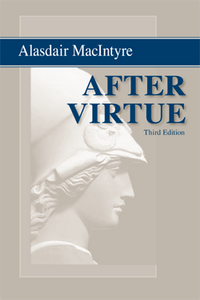After Virtue, by Alasdair MacIntyre
Book Review
Title: After Virtue: A Study in Moral Theology, 2nd Edition
Author: Alasdair MacIntyre
Publisher: Notre Dame: University of Notre Dame Press, 1984
Reviewer: Nell Becker Sweeden
In After Virtue, Alasdair MacIntyre takes to the task of exposing modern liberal societies, born out of Enlightenment individualism, as morally vacuous. Their moral lack arises as a result of a society’s denial or neglect of its own narrative history and the impetus to fragment persons from their historical narrative and community for the perpetuation of the individualist modern myth. MacIntyre looks to the Aristotelian virtue tradition as one in which virtue remains encompassed within the narrative unity of a human life evidenced in practices learned together with a community unified by a shared vision of the good (258). Thus, MacIntyre suggests that the teleological unity of an Aristotelian tradition provides the necessary alternative to liberal individualism. Additional salient points emerge as MacIntyre unfolds this task further. MacIntyre asserts that all reason emerges from a living tradition; in fact human self-knowledge also emerges from somewhere. He writes, “What I am therefore, is in key part what I inherit, a specific past that is present to some degree in my present” (221). In this sense, the notion of a modern “individual” as a rational, independent agent is a myth. Rather, each person is housed within a particular narrative or history. Narrative history is the basic genre for all characterization of human actions (208).
In building his argument, MacIntyre carries out the effects of modern individualism into modern societies and attributes the lack of substantive moral unity to the fact that society has become “a collection of strangers, each pursuing his or her own interests under minimal constraints” (251). Such societies are governed by “a set of institutional arrangements for imposing a bureaucratized unity” in the absence of possible moral consensus (254). There is no common substantive goal for which society works, rather it operates toward the preservation of each citizen’s pursuit of his or her own interests. In turn, without a unified goal, any notion of justice within society remains muddled and unclear. Additionally, any notion of virtue within this ‘collection of strangers’ is unclear—choices become criterionless and there are no grounds for settling discussion between rival notions of good because any tradition bearing virtues is veiled, subdued, or rejected (202).
Of note in MacIntyre’s historical analysis is how he brings to light the notion of “practice” in reference to teleological virtue. Practices, for MacIntyre, embody goods internal to the practice agreed upon according to the telos of the social community. Virtue requires embodiment in practice. In fact, MacIntyre defines a virtue as, “an acquired human quality the possession and exercise of which tends to enable us to achieve those goods which are internal to practices and the lack of which effectively prevents us from achieving any such goods” (191). As such, practice is carried out in reference to one’s relationship with other practitioners according to shared common standards. In this sense, living out shared virtues in relationship with a community is a dynamic process which is never completed.
Additionally, MacIntyre nuances how the Aristotelian concept of telos is understood not as something achieved at any point in time, but as the way human life is constructed (175). In other words, human life is oriented toward something in relationship with its present community and historical narrative. MacIntyre’s development of historical narrative, practices embodying shared communal good, and telos offer insightful reflection into a Christian life and faith community. MacIntyre’s notion of telos as ‘a certain kind of life’ parallels the Christian life in which the people of God are journeying toward God’s heavenly reign (telos) in the sense that they embody the way of this reign learned as they journey together. They are a particular people—God’s people—embodying a particular way of life. The virtues of the Christian tradition, in this sense, are visible and embodied in the community’s practices. Such practices will not always look the same because they are carried out in relationship with the Christian community in different times and places. Interestingly, one can witness within history the ecclesial body’s discernment in both institutional forms and informal shapes, both of which shape practices over time and interpret the shared historical narrative. Within this, one can also witness communities working out rival concepts of virtue. In this way, communal discernment and formation are central to how practices are shared, reshaped, and carried out over time and within contexts. For example, the practice of hospitality—or the welcome of the stranger based on the virtues of love of God and neighbor— translates to various forms and embodiments as this Christian practice is continually communally discerned within a given time and place. Additionally, such practice is discerned not only within a present context, but, at the same time, from within the narrative history of the Hebrew and Christian scriptures, the lived histories of Jesus and the early church community, and the lives of the saints. In this way, discernment, formation, and embodying of virtues happen within the living tradition of a community.
